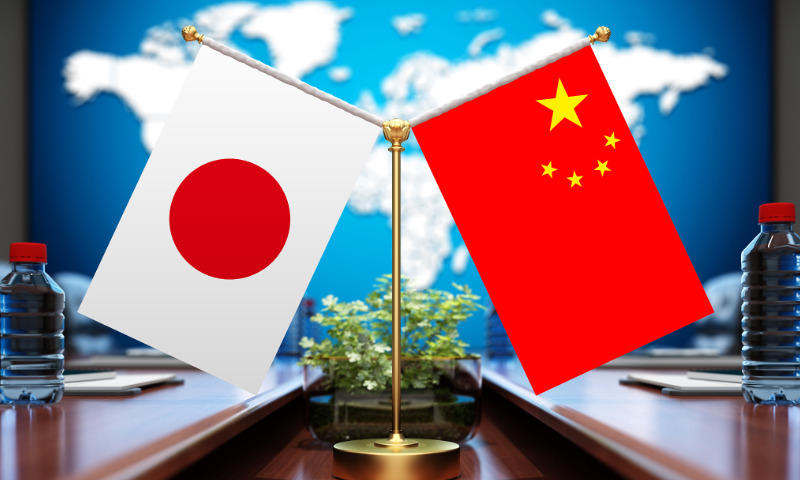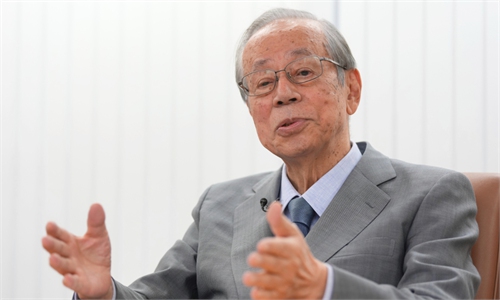Japanese FM to visit China this weekend; move seen as positive amid strained relations but more efforts needed

Photo: VCG
China on Friday confirmed the visit of Japan's Minister for Foreign Affairs Yoshimasa Hayashi and expressed hope to work with Japan to build a stable and constructive China-Japan relationship fit for the new era.
Experts saw Hayashi's trip to China - the first visit by a Japanese foreign minister in three years - as a positive move to restore high-level exchanges amid strained relations. But they also pointed out the key to improving China-Japan relations lies in Japan and the Japanese government should stop provocations against China.
At the invitation of State Councilor and Foreign Minister Qin Gang, Japan's Minister for Foreign Affairs Yoshimasa Hayashi will visit China from April 1 to 2, Chinese Foreign Ministry spokesperson Mao Ning told a press conference on Friday.
China attaches importance to the visit by Hayashi. Chinese leaders will meet with him and State Councilor and Foreign Minister Qin Gang will also hold talks with him, during which they will have in-depth exchanges of views on bilateral relations and international and regional issues of shared interest, Mao said.
"China and Japan are neighbors who are important to each other. Maintaining the sound and steady development of bilateral relations serves the common interests of the two countries and the region," Mao said.
News of Hayashi's visit to China has caught attention in China and Japan. Many people in Japan have called for the Japanese government to alleviate the tense relations with China.
Yuki Izumikawa, a research fellow from Okinawa International University, told the Global Times that the Japanese government should take a step to develop friendly relations with China. China and Japan should also have dialogue to restore bilateral exchanges in the post-pandemic era.
As a major step to implement the consensus reached by the top leaders, the Japanese foreign minister planned to visit China last year but the trip was postponed due to the pandemic. While the bilateral relations are currently at a low ebb, Hayashi's visit is an opportunity for the two sides to exchange views on major issues that have strained relations, Xiang Haoyu, a research fellow at the China Institute of International Studies, told the Global Times.
Against the backdrop of the negative domestic atmosphere toward China, Hayashi has been urged by some politicians in Japan to be tough on certain issues when coming to China, such as issues related to the South and East China Sea, said Xiang.
Japanese media reports also said Hayashi might urge China to release a Japanese national China has detained on suspicion of spying.
During the Friday press conference, spokesperson Mao Ning said that China is a country where the rule of law is upheld. The case will be handled in accordance with the law and the lawful rights and interests of the people concerned will be protected accordingly.
"We will allow the consular officials of the Japanese embassy and consulates to perform their consular duties in accordance with the provisions of relevant international conventions and the China-Japan Consular Agreement, and make timely arrangements for consular access," said Mao.
Analysts also noted that the Diaoyu Islands issue, the Taiwan question and the Russia-Ukraine conflict are also likely to be covered during Hayashi's visit.
Due to Japan's provocations, China-Japan relations have become cloudier. Aside from closely cooperating with the US in containing China, the Kishida government has rampantly hyped the Taiwan question and "China threat" narrative to find an excuse to bolster its defense capability. For example, in December 2022, Japan's ruling coalition agreed on a National Security Strategy update that describes China as an "unprecedented strategic challenge."
Many Chinese analysts expressed a cautious attitude about whether Hayashi's visit will help settle any disputes between the two sides. But they still believe it is "better than nothing" as more high-level, trade and people-to-people exchanges will ensue.
The Chinese and Japanese defense ministries have recently completed the construction of a direct telephone line for the maritime and air liaison mechanism. This will contribute to maintaining regional peace and stability, the Chinese Defense Ministry announced on Friday.
This year marks the 45th anniversary of the signing of the China-Japan Treaty of Peace and Friendship, which is important for bilateral relations. It is important for Japan to correct wrong perceptions about China, to abandon ideological bias and to alter its current negative policy on China, said Xiang.


